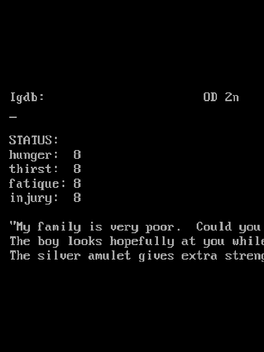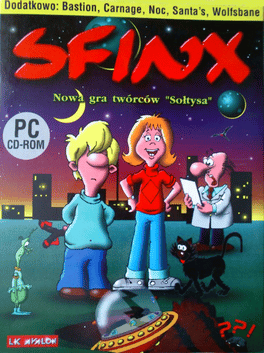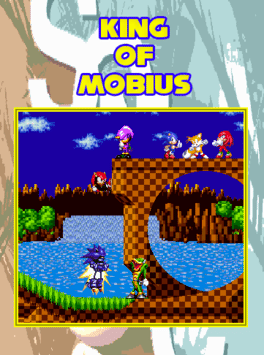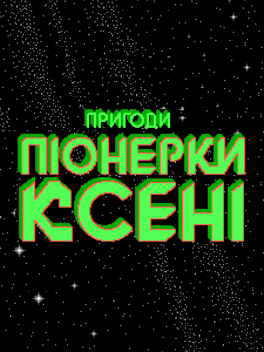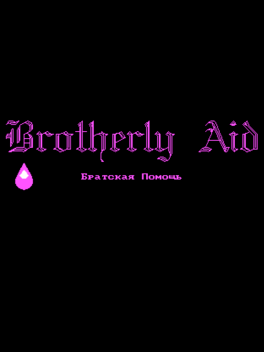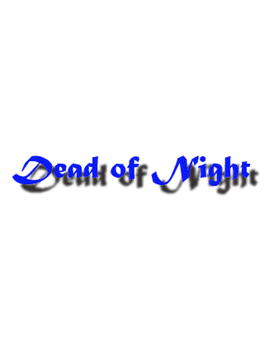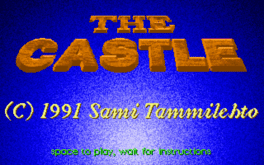Most Popular Dos Games - Page 18
-
The Kingdom of Syree II: Black Magic
1994
The Kingdom of Syree II: Black Magic is the sequel to the role-playing game The Kingdom of Syree. Like its predecessor, it bears considerable similarity to the early titles in the Ultima series. In Black Magic, the player resumes the role of the Lord Champion of Syree, who, having defeated the evil wizard in the first game, returned to the life of a simple farmer. This peaceful existence however is interrupted when the news come that the Keeper of the Power has passed away. The Keeper is a person responsible for all the mystic powers in the realm. When a Keeper dies, the power is immediately transferred to a newborn child. This child must be raised as a good person for magical powers to be available to everyone, but if the Dark Forces find the child first, the balance of magic power will be upset. So the Lord Champion prepares for another journey to save the kingdom. -
The Dragon Sword
1990
The Dragon Sword
1990
A band of fearless dungeon crawlers must seek out The Dragon Sword and confront the dragon Oijngate. The Dragon Sword is the fabled sword which has the power to defeat a powerful creature like Oijngate. The Dragon Sword is an RPG similar to the Wizardry series of games. You will explore large maps which you view in the first person and fight monsters in turn-based combat. You will create characters by giving them names and choosing their race and class and picking from randomly generated attributes. Then your selected group will dive right into the adventure. Monster encounters pop up unexpectedly so be ready to fight at any time. Your warrior and mêlée class characters can use an array of weapons against foes while magic casters can likewise use an array of magical spells and weapons. Once in a while you will run into a store where you'll be able to use collected gold and items to trade and purchase items of your choosing. The thirty levels that you will battle through will not only present combat but will al -
Esse mundo é um Colosso
1994
TV Colosso was a brazilian children TV Show from Rede Globo from 1993 to 1997. Editora Abril, in 1994, released a collection of illustrated books with this educative multimedia game as a gift. Travel the world with characters Priscila or Gilmar answering questions about the places you visit. Go for the best score! -
Silmar
1990
Silmar
1990
Silmar is a rogue-like/hack type of RPG, with random generated dungeons, in which you as an adventurer are descending to fight monsters and find treasure. The game was first released for DOS around 1990, with later incarnations running on Windows, Linux and OS/X. The DOS version has tile-based graphics, and was split in three parts. The first (Dungeons of Silmar) was distributed as shareware, and the second (An Everpresent Magic) and third (The Forward Terminus) parts were made available with the purchase of the first part. The story is that the evil wizard Syrilboltus was defeated in a war with a dwarf country called Gormarundon, but left a cursed magic labyrinth of dungeons under his tower, crawling with monsters, nearby the village Silmarii, which needs to be cleansed and sealed by reaching the bottom of the dungeons. Many adventurers have tried but failed, and now you are to try your luck. You choose your character from a list of mixed characters, ranging from werewolves to baseball players (oh, the horror!) -
Sergueis Destiny
2001
Sergueis Destiny
2001
The evil sorcerer Blackmagic took over a village named Jolimy. Only a lone apprentice magician named Serguei can eventually defeat him and liberate his homeland. Serguei's Destiny is made with the AGI interpreter, which was the engine used for Sierra's adventure games in mid- to late 1980's (such as for example the first two Space Quest games). The game is primarily an adventure, but there are RPG elements as well: Serguei accumulates experience and learns new spells by completing quests. -
Ranadinn
1988
Ranadinn
1988
You are a Battlemage - a Ranadinn: you have the skills of a fighter, a wizard and a cleric. You've arrived at the islands of Argentan as a mercenary, to help repel an inhuman horde from the South. Monsters have settled into caves and abandoned castles, villages are under attack, and one of the four islands has already been conquered. The king has hired you to help save his defenseless lands, and off you go on your quest: to find the secret of the invasion's leader, a mysterious sorcerer possessed by a long-dead evil, and vanquish him. -
Psionics
1993
Psionics
1993
After a long trip you've finally arrived at the Nexus space lab, where curious scientists were to examine your uncanny psychic potential, a talent even you couldn't comprehend. Little did you know, getting ready for a rest, that you'll be awoken by screams, lights going out, and your examiner being eaten alive by huge rabid rats! Psionics is a simple sci-fi dungeon crawler in which the player must escape from a maze-like space station. Apart from finding a couple of items that will help you in the way, you'll be often facing mutated animals, which you may defeat not only using weapons, but also your psionic powers. -
MAG
1988
MAG
1988
In this ASCII rogue-like (dungeon crawls with randomized maps) the player explores 20+ levels of a dungeon in order to capture a magical artifact, the Sudbury Sapphire from a group of Imperial Dragons. Features include animated vine traps, labyrinth traps, torches on the walls that can be lit, and pools of vomit. -
Joyous Rebel
1996
Joyous Rebel
1996
Joyous Rebel is an RPG inspired by the Ultima series of games. Initially a shareware title, it was later made available free of charge. It is a reworked version of a smaller game known as Joyous Rebellions of Jive Culture. As a guardian it is your duty to defend the king of light. But you had to travel from you islands on a journey of peace and while you where gone booth the king and you feels that evil draws near. You hurry back to you island to defend the king but an enormous storm slows you down and a lightning almost kills you when it hits your boat a fisherman saves you and let you sleep over the night in his cabin. You are now well rested and must hurry to the caste to save the king of light. The screen is divided into two parts; to the left is the game area where all the action takes place and to the left is your inventory and indicators of what action you are about to execute. In the game you can use four commands: change between attack mode and walk mode, fire ballistic weapon, Do it (climb stairs, open -
Ferret
2009
Ferret
2009
Ferret is a retro-style puzzle-solving game. The game was born during the 80's in the world of mini-computers. It will test your ability to solve problems, not your hand-eye coordination. Unlike similar games, you have all the information you need, there are no secret instructions and definitely no cheats. Can you rise to the challenge? -
FallThru
1989
FallThru
1989
The beautiful vistas of farmlands, forests, mountains and deserts that greet you upon your arrival on Faland does little to calm your nerves about how you arrived at this strange land. Considering how dangerous it is with all the demons, monsters, wild animals and renegades running around you know you have only one thing you must do. Get back home. The farm settlement of Or'gn is where your journey home begins. You and up to three players take turns trying to reach home while scoring as many points as possible. Since the journey is dangerous you may die but you will have multiple chances to continue your quest at a cost of demerit points. You must examine many items, talk to the inhabitants and solve side-quests. Arm yourself well and do battle with the enemies lying in wait. Earn ralls, the currency of choice around these parts, by finding treasure or trading commodities with shopkeepers. Raise your status high enough and you just may find your way back home. Utilizing a rich back story FallThru is a interactive -
Dungeons of Kairn
1989
Dungeons of Kairn
1989
Save the kingdom of Hamnlin from the Mad Mage Inshanis, by setting out to recover Artifacts hidden throughout the vast lands of Kairn. Recruit new adventurers from a variety of professions and level them up as you gain experience, slay monsters and explore the dungeons. The Mad Mage is in possession of all the Artifacts save three. These you must recover, then journey to the Mad Mage’s island and use them to defeat him. The shareware version only includes the first dungeon; a registered copy adds the other 3. -
Dismal Passages
1992
Dismal Passages
1992
In Dismal Passages you are cast in the role of a youth who lives in a land called 'Drelg Artavia', which is being harrowed by evil Wraiths from the NetherRealm. In the grisly text introduction, your home is invaded during the night by three wraiths who attack and kill both your parents and your sister, but before they can kill you too, a grey wolf-like character interrupts the assailants and manages to drive them off, while itself is mortally wounded. Using it's last breath, the wolf asks you to get revenge on the head wraith called 'Vaargerold' / 'Vaalgerald' for the death of himself and your family, and you set out next morning to achieve this. -
Bones: The Game of the Haunted Mansion
1991
Bones: The Game of the Haunted Mansion is a member of the pseudo-roguelike Wizard's Castle family. It is one of the oldest games of this family, originating in 1981 on DEC mainframes. The story is quite conservative: As in the other Wizard's Castle games, your task is to descend into a dungeon to find the all-powerful Globe of some mighty Warlock on the deepest level. The gameplay is a hybrid of boardgame-like exploration and roguelike dungeon crawl, the whole presented as in "windowed" interactive fiction game, while the setting is a mix of fantasy, horror and sci-fi elements, playing in a haunted mansion filled with dust, bones, undead skeletons, RAM chips needed for auto-mapping, Uzis and Laser guns, etc. The only graphics is the BGI title screen; the rest of the game plays in text mode and reminds late DOS applications with windows. -
Sfinx
1997
-
King of Mobius
2001
King of Mobius
2001
King of Mobius is a Sonic the Hedgehog fangame developed from the M.U.G.E.N engine by Boomer. -
Pryhody pionerky Kseni
1991
Clone of "Adventures of Captain Comic" remade on the Soviet theme and translated into Ukrainian. -
Brotherly Aid
1989
-
Dead of Night
Dead of Night is a 2D platformer set in the world of Ancient Greek mythology. The game was developed for the Enix International Entertainment Contest in the Fall of 1996. The released version of Dead of Night – which is only a demo – only contains the first quest given by Zeus to Heropheles: to slay the Hydra and retrieve the map of the Underworld. The continuation of the story is hinted at but was apparently never done, otherwise the game is feature-complete. -
The Castle
1991
The Castle
1991
This game can be called an ancestor of the Worms game series. The goal is very simple: you need to destroy the enemy's fortress with the help of cannonballs. However, behind the simplicity, a far more intricate process is hidden. The Castle allows the player to customize the game settings to diversify each duel: you can change the curvature of the landscape and the height at which the fortresses are relative to each other; you can change the degree of influence of the wind on the shots; you can even choose the magnitude of the gravitational force and the number of hits after which the fortress is considered defeated.


